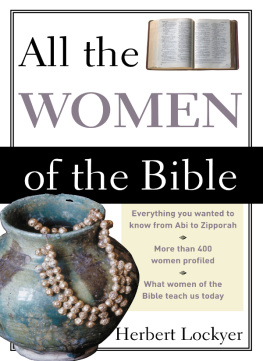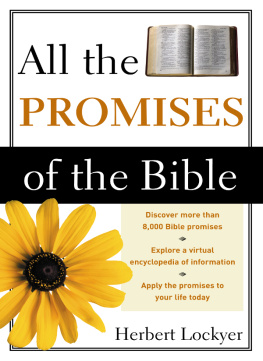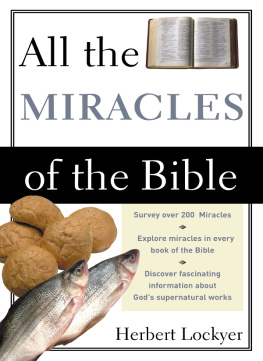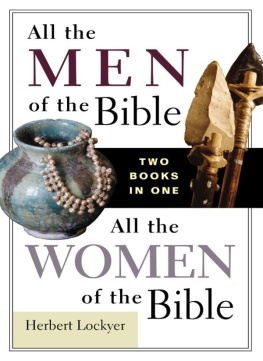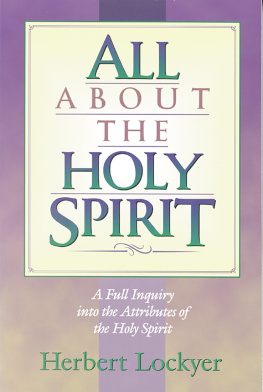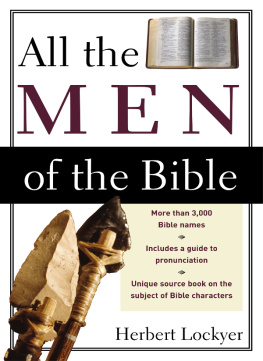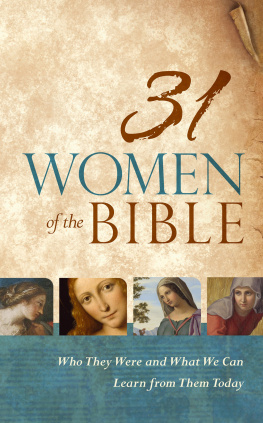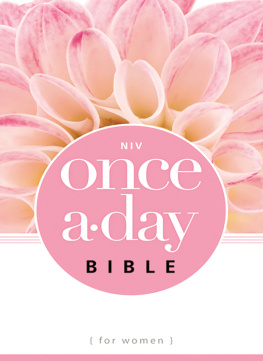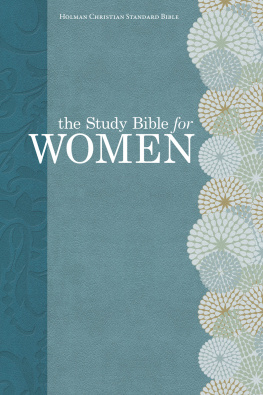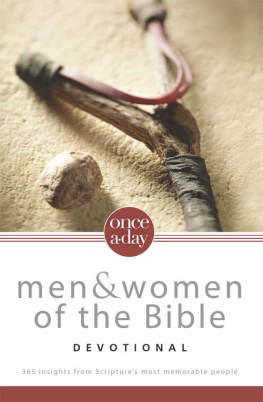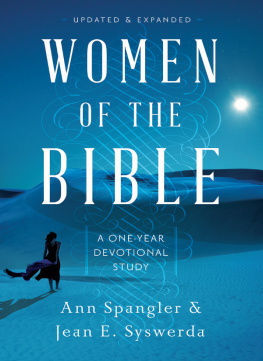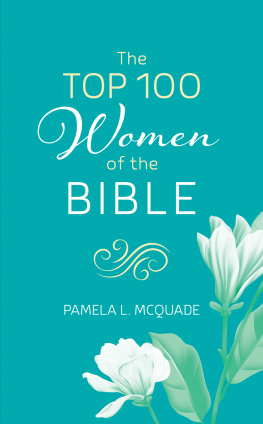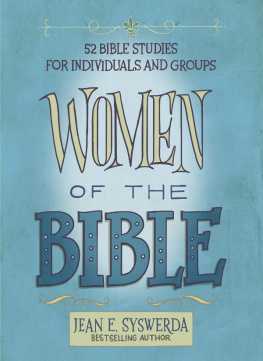Dr. Herbert Lockyer was born in London in 1886 and held pastorates in Scotland and England for twenty-five years before coming to the United States in 1935.
In 1937 he received the honorary Doctor of Divinity degree from Northwestern Evangelical Seminary.
In 1955 he returned to England where he lived for many years. He then returned to the United States where he continued to devote time to the writing ministry until his death in November of 1984.
In 1956, during one of his business trips to Europe, Pat Zondervan, of the Zondervan Publishing House, and I met in a London hotel to talk over matters of mutual interest. Having been associated with both Pat and Bernie Zondervan from the small beginning of their now large publishing concern, I was always excited over any new venture undertaken. I was not prepared, however, for Pats surprising proposal that I should author a large volume on All the Men of the Bible. But after a full discussion of the project, I consented, somewhat reluctantly, to the commission. At the time I did not realize that the Bible mentions some 3,000 men, but when I did I became frightened at the task of trying to delineate Gods portrait gallery of male characters. Well, the volume appeared in 1958, and has gone through many editions.
The most logical companion study to follow would have been All the Women of the Bible, but in 1955 there had appeared a book bearing this title by the gifted authoress, Edith Deen. Published by Harper and Brothers, New York, this entrancing and incomparable coverage of the theme is the most comprehensive one extant, and one which no student of the female characters of Scripture should be without. It is superb in its classification and exposition of every known and unknown woman in the Bible, and will remain a classic in its field. Along with multitudes of other Bible lovers I acknowledge with gratitude my debt to Edith Deen for her monumental work.
Having received scores of requests from readers for a further companion on the women of the Bible, the publisher urged me to accede to his desire to author this volume. After much prayerful thought I decided to undertake the assignment in my own particular style, hence this further addition to the All series.
A continuous sojourn for over a year in the world of Bible women, caused one to realize how intimately they were associated with the unfolding purpose of God. With the first woman He fashioned there came the first promise and prophecy of His redemptive plan for mankind. Because He is no respector of person or sex, He used and still uses women to accomplish His beneficent ministry in a world of need. While it is sadly true that it was a woman who brought sin into Gods fair universe, it was likewise a woman who gave the world the Saviour from its sin. Furthermore, the student of Scripture female biography is impressed with the fact that men and nations are influenced by the quality of women; and it is still true that the hand that rocks the cradle rules the world.
Another impressive fact I discovered was the way in which women in Bible times find an echo in the traits of women today, as Dr. W. Mackintosh Mackay so convincingly proves in his two volumes on Bible Types of Modern Women, and as Dr. George Matheson does in The Representative Women of the Bible. In the latter work, Dr. Matheson portrays fifteen Bible women as representing different types of female qualities as well as of universal humanity. One of his observations is that, The women of the Sacred Gallery were much more dependent on environment than were men; the men could seek foreign influence, the women had to wait till foreign influence should seek them. Human nature remains very much the same, as millenniums come and go. As long as history continues, women remain women, in spite of their present effort to become more masculine. Looking into the mirror of Scripture, women of today can see their counterparts both in the women whose names remain and in the lives of those who are anonymous. Unattractive women, like Leah of old, still clutch and strive desperately to hold the man they love. Others, who are beautiful like Rachel, Leahs sister, still feel that life owes them romance and happiness. This is not because of any brains they may have, but simply because of their beauty which is still, in spite of all artificial aids to enhance it, only skin deep. Hannah illustrates both the despair of being childless and yet the grace of noble motherhood (I Samuel 1-2:11); and in the motherly advice to a son, Solomon pictures the tireless life of a good and faithful wife and mother (Proverbs 31).
Referring to the fact that the women of the Bible form a feminine picture gallery unmatched in the whole of literature, H. V. Morton remarks that, the change, the inventions, the fashions which are the keynote of our time, are perhaps apt to make us forget that men and women have not changed much since the age of Genesis.
In God Speaks to Women Today, Eugenia Price deals with 26 females of Scripture, and in a most stimulating and provocative way provides us not only with vivid character sketches of these women, but also with a summary of their dilemmas so common to women in our century. This popular authoress whose every new book makes news, also reminds us that we can study Bible women as an isolated group whose lives are lived on an island, remote from other human beings. Studying what the Bible says about them, we also learn about their husbands, their children, their relatives and friends. How can one read all about Ruth the Moabitess, without a knowledge of her association even with King David, and his greater Son, even our Lord Jesus Christ! Woman is an integral part of humanity, and if humanity is to be purified and Christianized to a far greater extent, it is imperative to have an enlightened, spiritual womanhood. May God increase the number of Christian women through whom He can draw a sin-cursed, war-weary earth nearer to Himself!
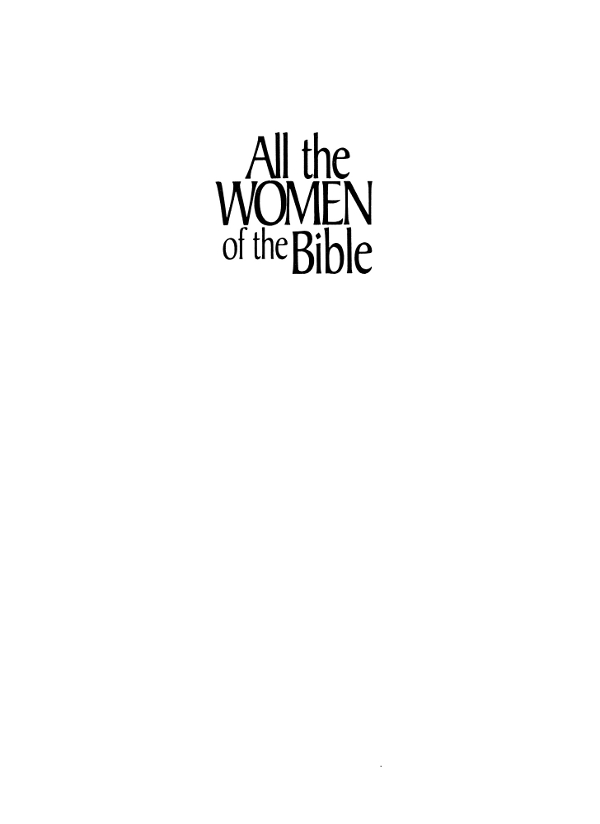
Although Bible women for the most part are shadowy, subordinate figures, particularly in the Old Testament, there were those like Sarah, Rebekah, Rachel, Miriam, Deborah, Ruth and Esther who were outstanding, each having a distinction of her own, as our next chapter shows. What is striking is the fact that whether the women were queens or commoners, chaste or bad, their lives are frankly portrayed, proving the Bible to be a faithful biography of humanity.
The sacred record of womans special creation (Genesis l:26, 27; 2:18-24), declares not only her full humanity but also her superiority to the lower animal world which God also brought into being. Woman appeared as the counterpart and helper of man, and being part of his inmost being holds an intimate relationship to him. Adam, being a collective term for mankind, includes women. Let us make

